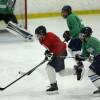In Danvers, public officials have faced calls to resign after concealing reports of boys on an ice hockey team striking their peers with a sex toy after they refused to shout racial slurs. In South Kingstown, Rhode Island, a coach was fired for conducting “fat tests” on naked male athletes. In Duxbury, a football coach was fired for using anti-Semitic language to call plays.
NBC Sports Boston's Trenni Kusnierek joined Boston Public Radio to weigh in on the recent wave of misconduct and harassment allegations leveled at youth sports programs across the region.
“I think it's always been there,” Kusnierek said. “I just think that this behavior has become acceptable and tolerated. I think that we now live in a society that is so polarized, and there is a group of people who feel like it is OK.”
More Local News
Kusnierek believes part of the blame for harassment in school sports falls on the adults in the room. In September, Roxbury Prep coaches said faculty and staff joined Georgetown High players in chanting racial epithets against members of the predominantly Black and Hispanic team.
“I just feel that there is a sense of gripping to a time of the past that some parents and coaches unfortunately, sadly, long for. And they are now telling their kids, ‘No one gets to tell you how you get to act,’” Kusnierek said.
“That anger is a group of people that they feel as if they are losing power, they're losing a sense of self. And then that, in turn, is unfortunately passed down to the young people, whether it's their parents at home, or it's this hockey coach or football coach.”
Kusnierek also thinks former President Donald Trump played a role in the prevalence of harassment among youth sports. “I'm not saying it all started with Donald Trump, but the permission that was given to people to act abusively,” she said.
She added that technology adds to these incidents. In Danvers, The Boston Globe reported that more than half of the 2019-2020 hockey team participated in a group chat that included racist and antisemitic text and images.
“I look at social media, and I think of what is tolerated and allowed behind a screen,” she said. “You become desensitized to that kind of talk and discussion.”
Kusnierek pointed out that another part of the reason so many of these stories have come out may be due to a growing climate where youth feel empowered to speak out about injustice. The harassment on the Danvers ice hockey team came to light after a player on the team reported his experiences to school officials and police.
“That takes a ton of courage, and I really credit his parents for that, you have to cultivate that,” she said. “Kids now, thankfully, feel empowered to speak up.”
Still, these reports can face internal pushback. In Danvers, the school district resisted The Boston Globe’s efforts to report on the investigation, initially refusing to provide a copy of the report and then providing one that was almost completely blacked out.
When it comes to harassment in sports, Kusnierek said she believes times have changed, and the culture in locker rooms must reflect that.
“We know more now,” she said. “We should be a more evolved society that understands that words are harmful and hurtful, and that people who endured these slurs and slanders and objectification and marginalization don't have to just grin and bear it anymore.”
Kusnierek is an anchor and reporter for NBC Sports Boston.








